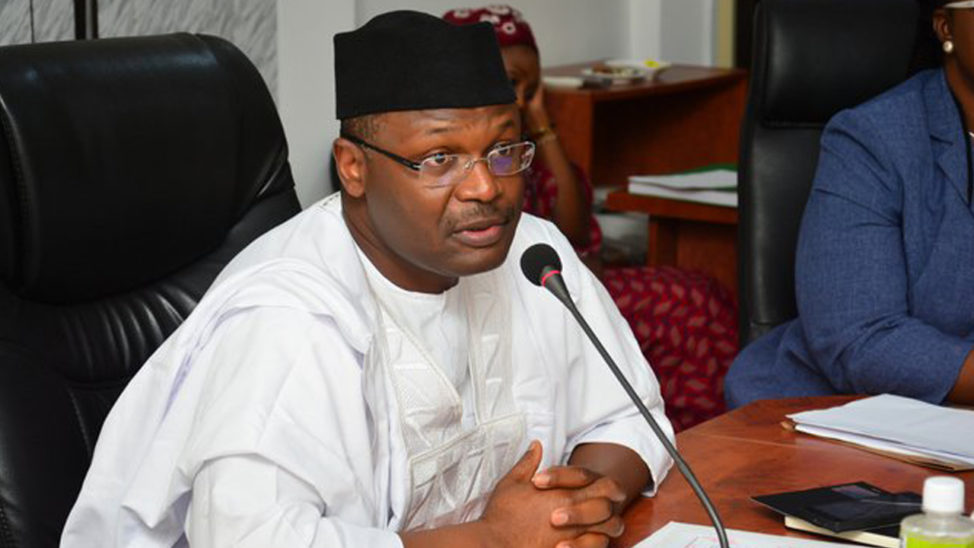
The presidential candidate of the Peoples Democratic Party (PDP), Alhaji Atiku Abubakar, yesterday, played a video recording before the Election Petition Tribunal to establish the allegation that the Independent National Electoral Commission (INEC) used a central server during the February 23 polls.
The film featured the Resident Electoral Commissioner, Mike Igini, notifying the public that the electoral body would transmit election results with the use of smart card reader (SCR) to the INEC central server.
Igini spoke in an interview with Channels Television shortly before the election.
Atiku’s counsel, Chris Uche (SAN), had tendered 48 Video Compact Discs (VCDs) that were admitted by the tribunal as part of efforts to substantiate alleged rigging for the re-election of President Muhammadu Buhari.
Uche, who led Atiku and PDP legal team, tendered the recordings through Mr. Segun Showumi, one of the media aides to the ex-vice president.
Igini, in the video, emphatically told the television crew that the electoral umpire was using smart card readers to transmit election results into its server.
However, under cross-examination by INEC, led by its lawyer, Unos Usman, Atiku’s witness admitted that Igini was not the official spokesman for the electoral agency.
Also, Buhari through his counsel, Alex Izinyon (SAN) had sought to play a counter-video recording tomorrow.
This followed the refusal of Atiku’s lawyer to allow the defendants to play their video.
In another recording, INEC Chairman, Professor Mahmood Yakubu, expressed optimism that the commission would use the electronic system during the general elections.
Earlier, the tribunal chairman, Justice Mohammed Garba, dismissed objection raised by Buhari and the ruling All Progressives Congress (APC) to tender and play the said video recording on the grounds that they were not front-loaded.
The judge held that Buhari, APC and INEC were bound by the pre-hearing report they freely signed to the effect that documents to be tendered from the bar could only be opposed at the final address stage.
The tribunal held that none of the four parties to the agreement could renege on any terms and consequently, admitted the video clips as tendered by the two petitioners through their star witness.
Also, three witnesses – Babagana Kukawa, Abana Pogu and Suleiman Mohamed Bulama from Borno and Yobe – had alleged that voters in the two states were harassed and intimidated.
According to them, even farmers were allegedly threatened to either vote for the APC or risk being ejected from their farmlands.
In his evidence, Bulama claimed that the ruling party used soldiers to molest, attack and injure some voters suspected to be sympathetic to the PDP.
He also alleged that village and district heads were used to coerce voters into casting their ballots for Buhari.
The hearing continues today.
In this article:
The film featured the Resident Electoral Commissioner, Mike Igini, notifying the public that the electoral body would transmit election results with the use of smart card reader (SCR) to the INEC central server.
Igini spoke in an interview with Channels Television shortly before the election.
Atiku’s counsel, Chris Uche (SAN), had tendered 48 Video Compact Discs (VCDs) that were admitted by the tribunal as part of efforts to substantiate alleged rigging for the re-election of President Muhammadu Buhari.
Uche, who led Atiku and PDP legal team, tendered the recordings through Mr. Segun Showumi, one of the media aides to the ex-vice president.
Igini, in the video, emphatically told the television crew that the electoral umpire was using smart card readers to transmit election results into its server.
However, under cross-examination by INEC, led by its lawyer, Unos Usman, Atiku’s witness admitted that Igini was not the official spokesman for the electoral agency.
Also, Buhari through his counsel, Alex Izinyon (SAN) had sought to play a counter-video recording tomorrow.
This followed the refusal of Atiku’s lawyer to allow the defendants to play their video.
In another recording, INEC Chairman, Professor Mahmood Yakubu, expressed optimism that the commission would use the electronic system during the general elections.
Earlier, the tribunal chairman, Justice Mohammed Garba, dismissed objection raised by Buhari and the ruling All Progressives Congress (APC) to tender and play the said video recording on the grounds that they were not front-loaded.
The judge held that Buhari, APC and INEC were bound by the pre-hearing report they freely signed to the effect that documents to be tendered from the bar could only be opposed at the final address stage.
The tribunal held that none of the four parties to the agreement could renege on any terms and consequently, admitted the video clips as tendered by the two petitioners through their star witness.
Also, three witnesses – Babagana Kukawa, Abana Pogu and Suleiman Mohamed Bulama from Borno and Yobe – had alleged that voters in the two states were harassed and intimidated.
According to them, even farmers were allegedly threatened to either vote for the APC or risk being ejected from their farmlands.
In his evidence, Bulama claimed that the ruling party used soldiers to molest, attack and injure some voters suspected to be sympathetic to the PDP.
He also alleged that village and district heads were used to coerce voters into casting their ballots for Buhari.
The hearing continues today.
In this article:
